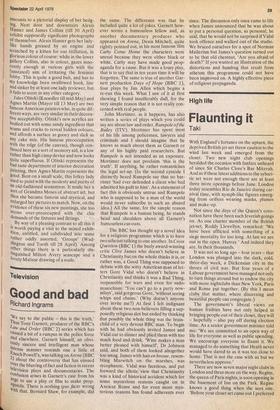Television
Good and bad
Richard Ingrams
'We say to the public — this is the truth.' Thus Tony Garnett, producer of the BBC's 1-4nv and Order (BBC 2) series which has caused a bit of a rumpus in the police force and elsewhere. Garnett himself, an obviously sincere and intelligent man whose intense manner reminds one a little of Enoch Powell's, was talking onArena (BBC 2) about the controversy that has ensued over the blurring of fact and fiction in recent television plays and documentaries. The Confusion arises in Garnett's case from his urge to use a play or film to make propaganda. There is nothing ipso facto wrong With that. Bernard Shaw, for example, did the same. The difference was that he included quite a lot of jokes. Garnett however seems a humourless fellow and, as another documentary producer who appeared on Arena, Denis Mitchell, quite rightly pointed out, in his most famous film Cathy Come Home the characters were unreal because they were either black or white. Cathy may have made good propaganda for a cause. But it was a lousy play, that is to say that in ten years time it will be forgotten. The same is true of another Garnett production Days of Hope (BBC 1), four plays by Jim Allen which begins a re-run this week. What I saw of it at first showing I found insufferably dull, for the very simple reason that it is not really concerned with real people.
John Mortimer, as it happens, has also written a series of plays which you could say are about law and order, Rumpole of the Bailey (ITV). Mortimer has spent most of his life among policemen, lawyers and criminals and I should imagine that he knows as much about them as Garnett or any of his highly paid researchers. But Rumpole is not intended as an exposure. Mortimer does not proclaim 'this is the truth'. If anything, he rather romanticises the legal set-up. (In the second episode I distinctly heard Rumpole say that no barrister 'had ever defended a client who had admitted his guilt to him'. As a statement of fact this is obviously untrue and Rumpole who is supposed to be a man of the world would never subscribe to such an absurd idea.) All the same, for the simple reason that Rumpole is a human being, he stands head and shoulders above all Garnett's humourless cut-outs.
The BBC has thought up a novel idea for a religious programme which is to have two atheists talking to one another. In Cross Question (BBC 1) the burly award-winning critic Clive James who doesn't believe in Christianity but on the whole thinks it is, or rather was, a Good Thing was supposed to debate with the witty American man of letters Gore Vidal who doesn't believe in Christianity and thinks it was a Bad Thing, responsible for wars and even for sadomasochism: 'You can't go to a party nowadays', said gorgeous Gore, 'without seeing whips and chains.' (Why doesn't anyone ever invite me?) At first I felt indignant about these two non-believers filling a supposedly religious slot but ended by thinking that possibly the whole thing was the brainchild of a very devout BBC man. To begin with he had obviously invited James and Vidal out to dinner and plied them with too much food and drink. 'Wine makes a man better pleased with himself', Dr Johnson said, and both of them looked altogether too smug. James with hairen brosse, resembling Marwitch on the marshes, was sycophantic. Vidal was facetious, and put forward the idiotic view that Christianity was a kind of historical accident which for some mysterious reasons caught on in Ancient Rome and for even more mysterious reasons has found adherents ever
since. The discussion only once came to life when James announced that he was about to put a personal question, so personal, he said, that he would not be surprised if Vidal took offence and walked out of the studio. We braced ourselves for a spot of Norman Mailerism but James's question turned out to be that old chestnut, 'Are you afraid of death?' If you wanted an illustration of the distortions and humbug that result from atheism this programme could not have been improved on. A highly effective piece of religious propaganda.


































 Previous page
Previous page